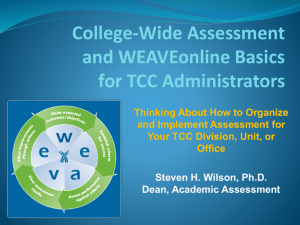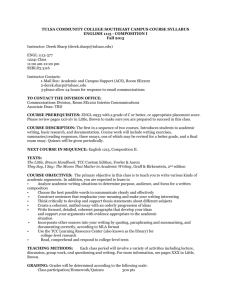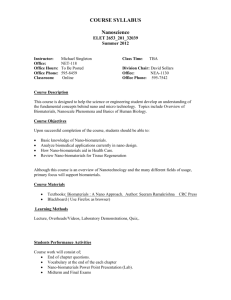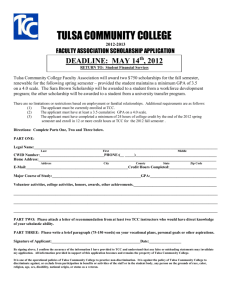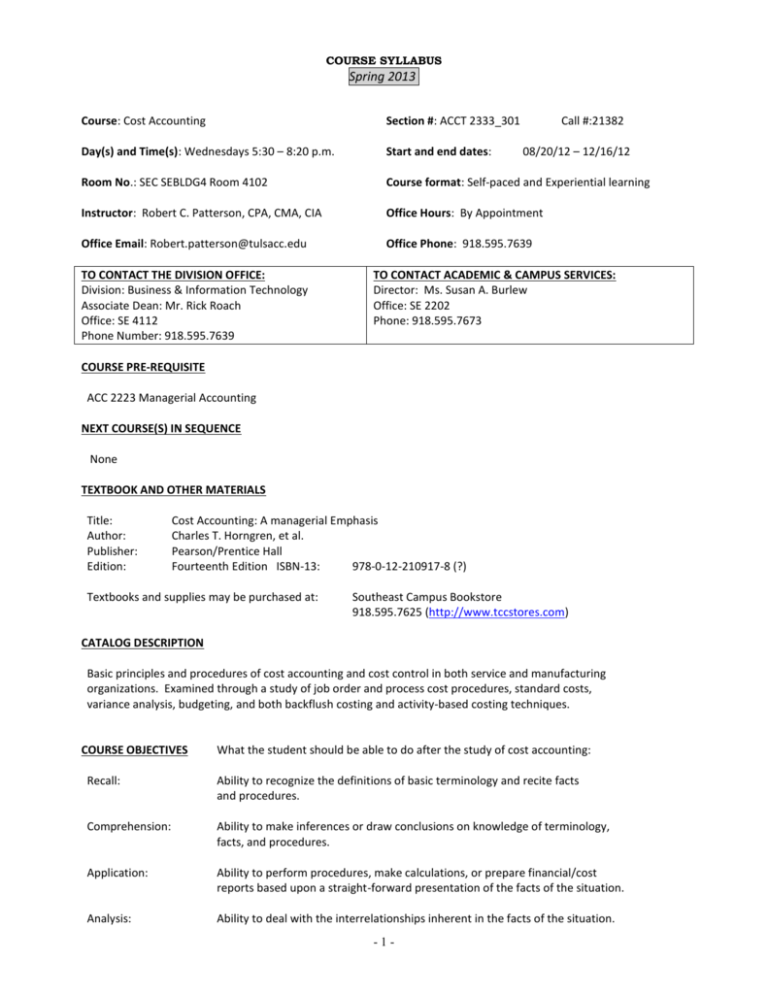
COURSE SYLLABUS
Spring 2013
Course: Cost Accounting
Section #: ACCT 2333_301
Day(s) and Time(s): Wednesdays 5:30 – 8:20 p.m.
Start and end dates:
Room No.: SEC SEBLDG4 Room 4102
Course format: Self-paced and Experiential learning
Instructor: Robert C. Patterson, CPA, CMA, CIA
Office Hours: By Appointment
Office Email: Robert.patterson@tulsacc.edu
Office Phone: 918.595.7639
TO CONTACT THE DIVISION OFFICE:
Division: Business & Information Technology
Associate Dean: Mr. Rick Roach
Office: SE 4112
Phone Number: 918.595.7639
Call #:21382
08/20/12 – 12/16/12
TO CONTACT ACADEMIC & CAMPUS SERVICES:
Director: Ms. Susan A. Burlew
Office: SE 2202
Phone: 918.595.7673
COURSE PRE-REQUISITE
ACC 2223 Managerial Accounting
NEXT COURSE(S) IN SEQUENCE
None
TEXTBOOK AND OTHER MATERIALS
Title:
Author:
Publisher:
Edition:
Cost Accounting: A managerial Emphasis
Charles T. Horngren, et al.
Pearson/Prentice Hall
Fourteenth Edition ISBN-13:
978-0-12-210917-8 (?)
Textbooks and supplies may be purchased at:
Southeast Campus Bookstore
918.595.7625 (http://www.tccstores.com)
CATALOG DESCRIPTION
Basic principles and procedures of cost accounting and cost control in both service and manufacturing
organizations. Examined through a study of job order and process cost procedures, standard costs,
variance analysis, budgeting, and both backflush costing and activity-based costing techniques.
COURSE OBJECTIVES
What the student should be able to do after the study of cost accounting:
Recall:
Ability to recognize the definitions of basic terminology and recite facts
and procedures.
Comprehension:
Ability to make inferences or draw conclusions on knowledge of terminology,
facts, and procedures.
Application:
Ability to perform procedures, make calculations, or prepare financial/cost
reports based upon a straight-forward presentation of the facts of the situation.
Analysis:
Ability to deal with the interrelationships inherent in the facts of the situation.
-1-
ACCT 2333-301 Cost Accounting
TEACHING METHODS:
Call No. 21382
The class structure will be primarily Lecture and experiential learning through case studies.
EVALUATION TECHNIQUES: The evaluation of each student will be based upon that person’s performance on: (1) two
examinations, (2) homework assignments, and (3) the Case Studies. Cases will be graded on proper punctuation,
spelling, and syntax as well as content.
The grading scale will be as follows:
Formal examinations (2)
Case Study (2)
Homework (12)
Total
100 points each
100 points each
50 points each
1000 points
A = 90 – 100%
B = 80 – 89%
C = 70 – 79%
D = 60 – 69%
F < 60%
Homework will be done on MyAccountingLab: Course ID: patterson96675
(900 – 1000 points)
(800 – 899 points)
(700 – 799 points)
(600 – 699 points)
(less than 600 points)
Check https://bb.tulsacc.edu during the semester for your grades and class averages.
Note:
An “I” or incomplete will not be given in this class.
Course Withdrawal: The deadline to withdraw from a course shall not exceed 3/4 the duration of any class. Check the
TCC Academic Calendar for the deadline that applies to the course(s). Begin the process with a discussion with the
faculty member assigned to the course. Contact the Advisement Office at any TCC campus to initiate withdrawal from
a course ('W' grade) or to change from Credit to Audit. Withdrawal and/or change to an audit from a course after the
drop/add period can alter the financial aid award for the current and future semesters. Students may receive an
outstanding bill from TCC if the recalculation leaves a balance due to TCC. Students who stop participating in the
course and fail to withdraw may receive a course grade of “F,” which may have financial aid consequences for the
student.
COMMUNICATIONS:
Email communications: All TCC students receive a designated email address (ex: jane.doe@tulsacc.edu). All
communications to you about TCC and course assignments will be sent to your MyTCC email address; and you
must use MyTCC email to send email to, and receive email from, the instructor regarding this course.
Inclement Weather: TCC rarely closes. If extreme weather conditions or emergency situations arise, TCC always
gives cancellation notices to radio and television stations. This information is also posted on the TCC website
(www.tulsacc.edu).
GENERAL EDUCATION GOALS: General Education courses at TCC ensure that our graduates gain skills, knowledge,
and abilities that comprise a common foundation for their higher education and a backdrop for their work and
personal lives. TCC’s General Education goals are: Critical Thinking, Effective Communication, Engaged Learning, and
Technological Proficiency.
CLASSROOM ETIQUETTE: Open and mutually respectful communication of varied opinions, beliefs, and perspectives
during classroom or online discussion encourages the free exchange of ideas that is essential to higher learning and to
the ability to learn from each other. Use of any electronic device is at the discretion of the instructor.
SYLLABUS CHANGES: Occasionally, changes to the syllabus may be necessary. Students will be notified of any
changes to the syllabus in writing.
DISABILITY RESOURCES: It is the policy and practice of Tulsa Community College to create inclusive learning
environments. Accommodations for qualifying students in compliance with the Americans with Disabilities Act (ADA)
and Section 504 of the Rehabilitation Act are available. To request accommodations, contact the Education Access
Center (EAC) at eac@tulsacc.edu or call (918) 595-7115 (Voice). Deaf and hard of hearing students may text (918) 8091864.
-2-
ACCT 2333-301 Cost Accounting
Call No. 21382
ACADEMIC DISHONESTY: Academic dishonesty (cheating) is defined as the deception of others about one’s own work
or about the work of another. Academic dishonesty or misconduct is not condoned or tolerated at campuses within
the Tulsa Community College system. Tulsa Community College adopts a policy delegating certain forms of authority
for disciplinary action to the faculty. Such disciplinary actions delegated to the faculty include, but are not limited to,
the dismissal of disrespectful or disorderly students from classes. In the case of academic dishonesty a faculty member
may:
require the student to redo an assignment or test, or require the student to complete a substitute
assignment or test;
Record a "zero" for the assignment or test in question;
Recommend to the student that the student withdraw from the class, or administratively withdraw the
student from the class;
Record a grade of "F" for the student at the end of the semester.
Faculty may request that disciplinary action be taken against a student at the administrative level by submitting such
request to the Dean of Student Services.
INSTITUTIONAL STATEMENT: Each student is responsible for being aware of the information contained in the TCC
Catalog, TCC Student Handbook, Student Code of Conduct Policy Handbook, and semester information listed in the
class schedule. All information may be viewed on the TCC website.
ATTENDANCE POLICY:
Attendance is the responsibility of the student. Non-attendance does not constitute formal
withdrawal. Withdrawal is the responsibility of the student. Please discuss any academic matters (i.e., drop or audit)
with the instructor before taking action. I realize that you have a significant investment in both time and money in
your education.
LATE ASSIGNMENTS AND MAKE-UP TEST POLICY: Make-up examinations will be given at the Counseling and Testing
Center - SouthEast Campus. Make-up examinations must be completed within two (2) days of the originally
scheduled examination (note: The final examination must be completed by December 14, 2011).
COPYRIGHT NOTICE: Any software described and utilized in this course is furnished under a license or nondisclosure
agreement with various corporations. The software may be used only in accordance with the terms of the agreement.
It is against the law to copy this software on magnetic tape, disk, or any other medium for any purpose.
Tobacco Free College: Tulsa Community College is a Tobacco Free college in accordance with the Governor’s
Executive Order 2012-01 and Title 63 of the Oklahoma Statutes, Section 1-1523 which prohibits smoking or the use of
any tobacco products in all public places, in any indoor workplace, and all vehicles owned by the State of Oklahoma
and all of its agencies and instrumentalities. This Order includes property leased, rented, or owned by TCC including,
but not limited to, all grounds, buildings, facilities, and parking lots. Tulsa Community College’s policy includes a
tobacco free environment on all campus and off-campus locations conducting TCC credit or non-credit classes. The
TCC Campus Police is responsible for ensuring compliance with the Tobacco-Free Environment Policy. Violations of the
policy may be addressed through issuance of campus or state citations.
-3-
ACC 2333-301 Cost Accounting
Call No. 21382
COURSE CALENDAR
Spring 2013
Date
January
February
March
April
May
Readings
Homework Assignments
16
Introduction
23
The Manager and Management Accounting
30
Introduction to Cost Terms and Purposes
6
Due Date (5:30 p.m.)
Determining How Costs Behave
13
Cost-Volume-Profit Analysis
20
Cost-Volume-Profit Analysis
27
Inventory Costing and Capacity Analysis
6
Decision Making and Relevant Information
13
Master Budget and Responsibility Accounting
20
No Classes
27
Direct-Cost Variances and Management Control
3
Overhead Cost Variances and Management Control
10
Job Order Costing
17
Process Costing
24
Pricing Decisions and Cost Management
1
Review
8
Final Examination
Specific Homework Assignments for each chapter are on MyAccountingLab
.This schedule is tentative and subject to change.
-4-


